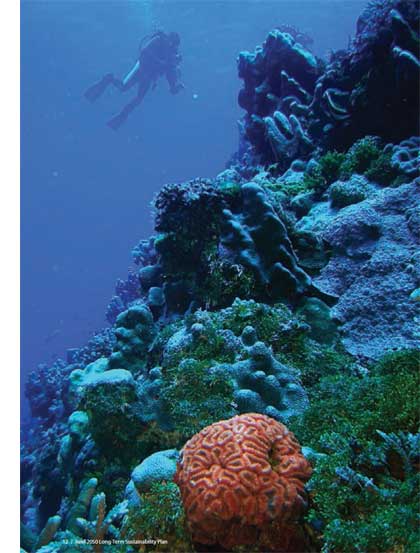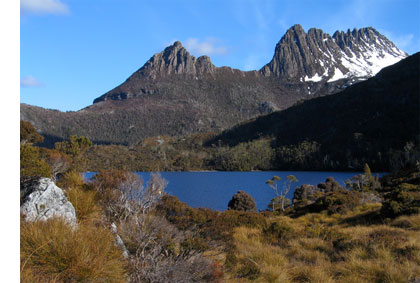The international gaze has turned to Australia’s environmental management with a United Nations summit in Germany putting the Great Barrier Reef, Tasmanian Wilderness and Australia’s climate policy under the microscope.
A draft decision of the World Heritage Centre (WHC) allayed fears the reef’s heritage status would be listed as ‘in danger’ on Friday, but the government was effectively told to take plans for the management of Tasmanian Wilderness back to the drawing board.
The mixed reviews come as Australia prepares to face a world grilling, literally, on Thursday as part of the UN process of determining the reductions in greenhouse gas emissions for the post-2020 period.
The Great Barrier Reef

The reef appears to be out of hot water for now with references to a ‘World Heritage In Danger’ listing, seen as important to avoid for the $6 billion economy which relies on the reef, dropped from the draft WHC determination.
A final decision will not be made until next month, but reiterated concern over the reef’s ‘poor and deteriorating’ health will see the reef remain on a watch list until at least 2019.
The reef is already significantly diminished, whether or not it is formally billed as ‘in danger’, having lost half of its coral cover in the last 30 years.
“Climate change, poor water quality from land-based run off, impacts from coastal development and some remaining impacts of fishing are the major threats to the [reef’s] future health,” the WHC said.
As part of its efforts to address these challenges and stave off an ‘in danger’ listing the state and federal governments jointly prepared a ‘Reef 2050’ plan earlier this year.
In its draft judgement the WHC praised the plan as a “major technical and policy achievement”, citing in particular a new goal of reducing run off pollution by 80 per cent within 10 years, an additional $200 million in funding, and restrictions on the dumping of dredge spoil.
Despite the forward steps, the draft decision, if adopted, will force Australia to submit a progress report of the implementation of its new plans by December 2016.
“If progress is not being made, the World Heritage Committee will again consider the reef at its 2017 meeting,” the WHC said.
The next comprehensive scientific report for publication by the government on the reef’s health is slated for 2019, and the draft ruling warned that if the reef’s health continues to slide to below 2014 levels it could still be declared ‘in danger’ at the end of the decade.
While environmental groups argue that with or without an official ruling the reef is in danger, both state and federal Environment Ministers welcomed the WHC draft decision in a joint statement.
“The World Heritage Committee acknowledges the strong response that Australia and Queensland have put in place through the development and implementation of the recently released Reef 2050 Long term Sustainability Plan,” the statement said.
“Our actions also include the unprecedented ban on the disposal of capital dredge material in the entire World Heritage Area and restrictions on port development.
“We have listened intently and responded directly to the concerns from the Australian community, the World Heritage Committee and their technical advisors.”
Environmental groups, however, argue the government must do more to rescue the reef.
The World Wildlife Fund, for example, expressed concern the Reef 2050 plan is “seriously underfunded” and that “without a significant increase in investment, it risks failing to achieve its goals”.
“Further, the Queensland Government must fully implement its election commitments to ban sea-dumping of dredge spoil in all World Heritage waters and restrict capital dredging to the four major ports,” a WWF spokesperson said.
The WHC also noted that some key commitments by Australian governments are yet to be legislated, and urged the government to deliver on the promised investment framework that will help implement the reef plan “as a matter or priority”.
“Sustained, adequate financing is central to the plan’s performance,” the WHC observed.
Tasmanian Wilderness

Australia’s world heritage report card on the management of Tasmanian Wilderness was far less rosy.
“A number of changes that are being proposed [by the Tasmanian government]would appear to directly threaten the protection of the Outstanding Universal Value of the [wilderness],” the WHC said.
Chief amongst them are Tasmanian government plans that allow for commercial logging and mining and a failure to meet UN demands to work with Aboriginal people to acknowledge the area’s cultural value.
In the draft decision the WHC “urges [Australia] to ensure that commercial logging and mining are not permitted within the entire property”.
“It needs to be recalled that the World Heritage Committee has repeatedly reiterated its position that mineral exploration and exploitation is incompatible with World Heritage status.”
The state Liberal government has also started an expression of interest process for the development of tourism infrastructure within the world heritage site, and this was one of “a number of concerns” expressed by the WHC.
Environmental groups greeted the criticisms as a vindication of their own critiques of the Hodgman government.
"It is an international embarrassment that Australia and Tasmania are once again in the international spotlight for attacks on the Tasmanian Wilderness World Heritage Area,” a spokesperson for the Bob Brown Foundation said.
"The current Government's plans to log, mine, allow for invasive developments and dump wilderness, replacing it with a 'remote recreation zone', are incompatible with World Heritage Area management.
“How many voices does the Hodgman government need to hear before it listens,” a spokesperson for Environment Tasmania asked.
The WHC said the voices of Aboriginal people, in particular, are not being listened to. The draft decision “expresses its concern that substantial progress has not yet been made on the survey of cultural attributes requested since 2013”.
In fact, the government does not foresee that work being completed until 2018 despite fresh urging by the WHC “to ensure this work is undertaken as soon as possible”.
In short, “the management plan cannot be seen as a document that sustains the outstanding universal value of the property”.
Climate Change

In the lead up to the Paris climate talks in December this year, Australia will also face questioning this Thursday at the Bonn meetings under a new multilateral assessment process that gives nations a chance to question emissions reductions policies.
Australia’s current policy, a five per cent reduction on 2000 level emissions by the end of the decade, is significantly lower than what is expected in the post 2020 period.
A recent round of questioning through the United Nations Climate process saw other nations grill Australia over its climate policies, which received a notably lukewarm reception.
Those questions, including requests from China to “please clarify the fairness” of mooted reduction targets, are as yet unanswered by Australia.
There is widespread uncertainty over whether the Abbott government will meet its low-bar 2020 targets through its ‘Direct Action’ policies, and doubt over how the policy could be extended to meet a more ambitious target in the post-2020 period.
The Federal Environment Minister Greg Hunt recently responded to calls from the government’s independent Climate Change Authority for a 30 per cent reduction by 2025 as an “onerous” task.
The current period of consultation is due to end in June, when the government will unveil its post 2020 targets.
Donate To New Matilda
New Matilda is a small, independent media outlet. We survive through reader contributions, and never losing a lawsuit. If you got something from this article, giving something back helps us to continue speaking truth to power. Every little bit counts.



